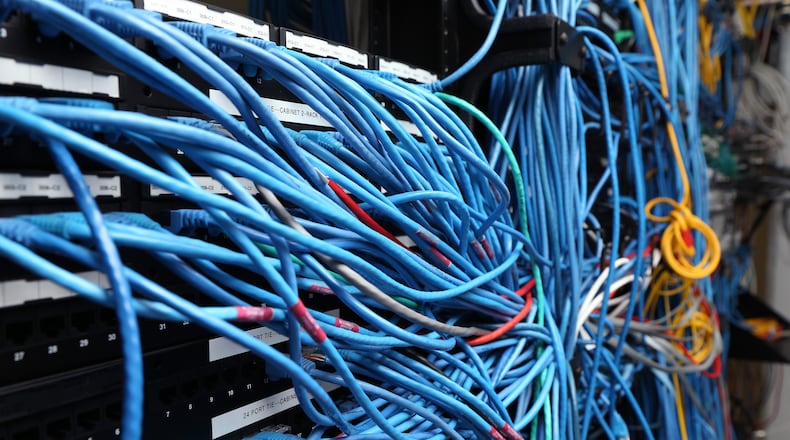Within the space of 24 hours last month, two contradictory events reverberated along the Atlanta-Washington D.C. axis.
At the state Capitol, after many months of study, a House Republican task force released its blueprint for saving a rural Georgia bereft of jobs, health care and, increasingly, people.
The foundation for the rescue effort: The extension of broadband internet access that could allow doctors to treat patients remotely, give students in poor school systems access to advanced courses, and provide employers with a firm and speedy connection to the rest of the world.
But one day earlier, the Federal Communications Commission, pushed by its chairman, Ajit Pai, had declared an end to net neutrality – the Obama-era proposition that internet providers should treat all clients and customers equally, as most utilities do.
Instead, the shift will allow providers to give priority – in terms of both capacity and speed – to preferred customers and streaming services.
Those with money will get the cream of internet service. But money is the one thing that rural Georgia hasn’t got.
The full impact of putting an end to net neutrality could take months -- even years – to measure. But it has already sown doubts in the Capitol. Last Thursday, the FCC released a 539-page ruling to back up its decision. That same day, I asked House Speaker David Ralston, R-Blue Ridge, if he and his GOP caucus had been able to digest impact of the FCC's December ruling.
“I’m not sure that we have. I’ve asked that question,” Ralston said. “And I’m not comfortable that we know where we land after that, with the efforts that we’ve talked about – enhancing our broadband in rural Georgia.”
Heavy lifts in the Capitol do not begin with the phrase, “I don’t know.”
Others are more certain about the impact of killing net neutrality, but not in a good way. “It’s great that Georgia is thinking of extending broadband connectivity to these rural areas. They desperately need it,” said Mei Kwong, project director for the California-based Center for Connected Health Policy, a group that promotes “tele-health.”
But with the end of net neutrality, rural communities could be vulnerable to the “pay prioritization” governing a cash-driven internet, she argued. “They don’t actually have that much money. That’s why they’ve turned to tele-health,” Kwong said.
Experts on how the internet works are few and far between in the state Capitol. The House Democratic expert is state Rep. Jonathan Wallace of Watkinsville. A software specialist, he was just elected in November.
“The way it’s being spun is, it’s going to incentivize competititon,” Wallace said. But again, competition is most often spurred by the chase for dollars, Wallace noted. And rural Georgia’s wallet is awfully thin.
Republicans in Washington well understand the problem. The solution is another matter. On Monday, before he flew to Atlanta to watch the college football championship game between the universities of Alabama and Georgia, President Donald Trump addressed an annual gathering of the American Farm Bureau Federation in Nashville.
Broadband was on his mind. “I will take the first step to expand access to broadband internet in rural America,” Trump said.
The result was an executive order intended to speed the placement of wireless transmitters or fiber cable on federal land and on federal buildings. Which might be helpful to some rural residents in the West, but not the South.
It is possible that the end of net neutrality on the internet, by threatening to widen the chasm between urban and rural America, could actually encourage more active government involvement, on par with the federal rural electrification program of the 1930s.
Although a comparison to the Eisenhower-era construction of a federal interstate system might be more appropriate.
Last September, the Georgia Department of Transportation put out word that it was seeking a private partner (or partners) for an ambitious effort to place fiber optic cable along the right-of-way of all federal interstates in Georgia.
The justification: “Installing this fiber would provide improved statewide internet coverage to meet the internet needs of rural communities while enabling GDOT to better connect all offices and improve traffic management throughout Georgia.”
Wireless transmitters would be installed on utility poles on state roadways.
"The DOT would reserve some capacity for itself, and lease out the rest," said state Sen. Steve Gooch, R-Dahlonega. He's been working with Lt. Gov. Casey Cagle's staff to draw up legislation to back the move. It could be introduced as soon as next month.
The project would be a massive undertaking that could require hundreds of millions of dollars and perhaps a decade to complete, Gooch said. But it would have an added advantage: The push toward autonomous vehicles will require that kind of digital access in any case.
Financial support from the state or federal government would be required. Some of the money could come from Trump’s promised push for infrastructure construction.
Or, said Gooch, in the form of block grants from the U.S. Department of Agriculture, now being run by former Georgia Gov. Sonny Perdue.
‘We’ve got to have a plan. That’s the first thing we’ve got to have,” the Dahlonega senator said. “If we don’t connect our small rural communities to the rest of the country, we’re going to widen the gap that’s already there.”
About the Author
The Latest
Featured




